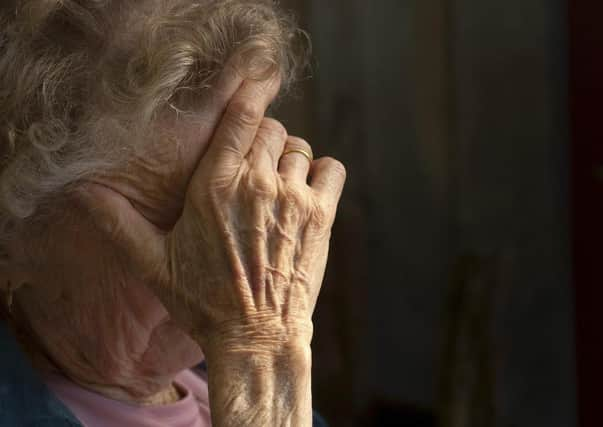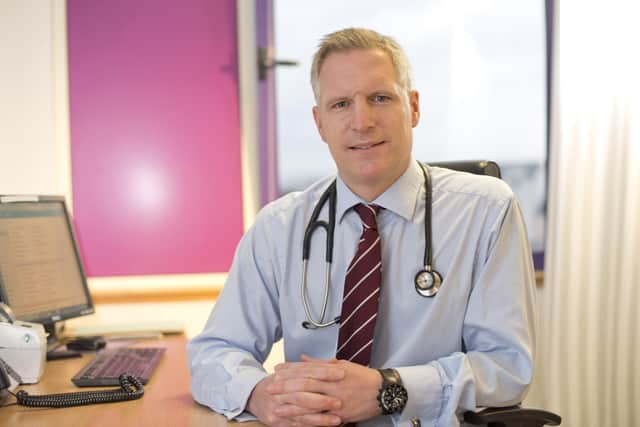Dr Alan Stout GP: ‘Closing schools is a massive step and we only get one change at robust measures so we need to get timing right’


It was discovered in the 1960s and has long been regarded as one possible cause of the common cold. Variants and other members of the coronavirus family have emerged over the years, some more serious that others.
The current variant covid 19 is the new variant causing our concern both in the potential severity of symptoms in some people, but also in its rapid spread across countries and continents.
Advertisement
Hide AdAdvertisement
Hide AdThe actual term ‘corona’ virus derives from its crown like appearance under a microscope.


It is vital to emphasise that in the vast majority of people, over 80%, infection will result in relatively mild and short lived symptoms, similar to a cold, and some will barely notice that they have it at all.
It is the potential effect on our older population and those with pre-existing conditions including a weakened immune system that most concerns us and is influencing our response.
Many comparisons have been made with the seasonal flu which is an important comparison even if they do differ clinically. We still have approximately 8,000 deaths per year across the UK related to seasonal flu, but very importantly we also have a very extensive and a very successful vaccination program that protects many, many people and prevents significantly more deaths.
Advertisement
Hide AdAdvertisement
Hide AdWe do not have a vaccine for covid-19 and this is why we have to take alternative measures to protect this group of people in particular.
This then becomes fundamental in what we do and the UK governments response has been very much targeted at protecting this population group and also at slowing the spread on the virus.
We began with a containment phase, where individuals entering the country from affected areas were identified and tested depending on where they were travelling from. If symptomatic or testing positive they were then rapidly isolated in an attempt to control and spread to others in what is called ‘community transmission’.
It is credit to the advice given, to the contact tracing performed, and to the public in Northern Ireland for following that advice, that the containment phase was relatively successful and only showed an initial slow increase in numbers in cases and no evidence of community transmission.
Advertisement
Hide AdAdvertisement
Hide AdOnly recently seen increasing numbers affected and evidence of community transmission and this is why we have moved to the delay phase.
This effectively means that the virus is circulating, many people will get it, most will be perfectly OK, but we need to control the speed and extent of the spread and also crucially start to protect those most at risk.
This is why the advice is now to start to minimise unnecessary contact or travel, minimise large gathering and crowds, to self-isolate if you or a household member develops symptoms, and also importantly to introduce ‘social distancing’ where the chances of spread to those at most risk is significantly reduced.
These are significant steps, but vital ones to ensure protection. It is impossible to understate the ongoing importance of good and proper basic hygiene measures including washing your hands and using a tissue which are so simple but massively effective in controlling spread.
Advertisement
Hide AdAdvertisement
Hide AdThe public in NI have been exceptionally good at following the advice so far and it is recognised that the current advice is very constricting for many, but it is vital that people continue to listen to and follow the advice.
There has been much debate about some differences in advice being given in different countries both in Europe and in the rest of the world. The differences are not as great as sometimes reported and nearly all countries are now at the point of slowing the spread (or flattening the curve) and protecting the at-risk groups.
The UK has the world’s best expertise and has also an extensive experience in medical emergencies and preparedness and we have got to trust this expert advice. It is massively counterproductive to have conflicting advice and this spreads doubt and creates unnecessary anxiety.
We have seen recently how when presented with new data-modelling quick decisions were taken to change the advice to the public.
Advertisement
Hide AdAdvertisement
Hide AdWe are rapidly seeing the huge knock on effects outside of just health coronavirus will have, and whilst not being the main deciding factors, they are understandably influential.
Schools are now closing but we get only one opportunity to introduce more robust measures including closing shops or businesses and we need to make sure the timing is right and the impact is most effective.
These are huge lifestyle changes for everyone, that could potentially last a long time, and there is a risk that if they are introduced too soon, they will last for a very long time and people will struggle to comply, if introduced too late we will see an uncontrolled spread throughout the population.
We as medical professionals need to trust each other, we need to trust the public to follow the advice and we as the population need to trust the experts.
• Alan Stout is chair of the GP Committee of BMA for Northern Ireland